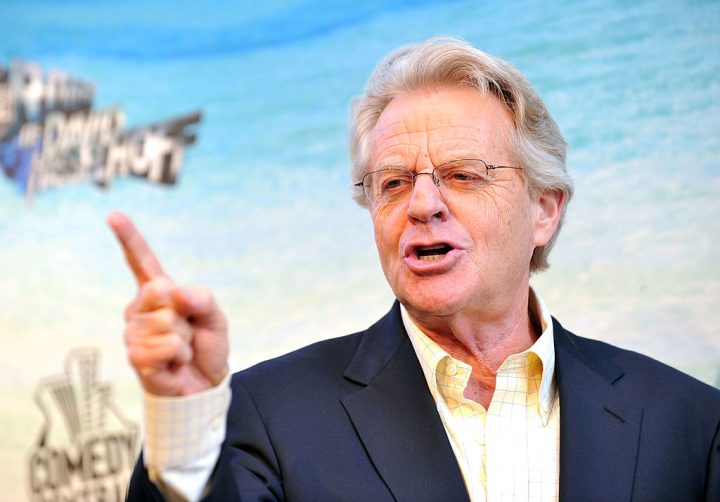Those of us who worship at the altar of reality television have Jerry Springer to thank (or to blame).
Springer was an early pioneer of reality TV. His show was the beginning of the end of television as the world once knew it. You didn’t need to be talented or interesting or rich or even beautiful to garner attention. He brought a new kind of intrigue and voyeurism on to our screens – he showed people to people as entertainment.
He made ordinary humanity extraordinary: shouting, screaming, even, on occasion, violence featured on his show
Despite beginning his career in politics, working for Bobby Kennedy before becoming the mayor of Cincinnati, Springer was best known for the self-titled Jerry Springer Show which ran for 27 years. Initially the show was straightforward: it focused on social and political issues. As the ratings grew the absurdity of the storylines grew.
In every episode, Springer created a sort of theatre of life. He took the Oprah Winfrey formula and turned it into something wilder and weirder. His success spawned the hundreds of reality shows that have followed. Without Springer, there would be no Big Brother, no Real Housewives, no Kardashians.
He made ordinary humanity extraordinary: shouting, screaming, even, on occasion, violence featured on his show. Real people, real grievances – it didn’t matter if it was actually fake. Fakeness was the reality.
And Springer was, like all great reality stars, a great actor. His widespread popularity was because he conveyed humility so well. This was performative, of course, but it felt true, which helped him connect with millions of Americans.
He was self-effacing and perceptive, almost priest-like. His avuncular little sermons – ‘Jerry’s Final Thought’ – oozed sincerity. Born in London, the child of Jewish emigres, Springer believed that much his life was down to luck: ‘In one generation my family went from annihilation [in the Holocaust]…to this ridiculously privileged life I live today because of my silly television show,’ he once said.
He was instantly likeable, warm and self-aware as evidenced in his commencement address given to Northwestern graduates in 2008. ‘I’ve been virtually everything you can’t respect; a lawyer, a mayor, a major market news anchor and a talk show host. Pray for me. If I get to heaven, we’re all going’.
It didn’t matter that he was also a bit of a wrong ‘un. In 1982, when running to be the Governor of Ohio, he addressed the fact he had been caught visiting a prostitute in an advertisement for his campaign: ‘I’m not afraid, even of the truth, even if it hurts.’
When faced with criticism and controversy Springer stood by his decisions. When questioned on Radio 4’s Desert Island Discs as to why he would give a platform to neo-Nazis, Springer, whose parents were among the last Jewish families to escape Berlin in 1939, declared ‘the only way we beat down these…evil ideas is by sunlight. When you keep it quiet it grows’. It’s also, of course, great for the ratings, as Donald Trump would note.
At its peak, the Jerry Springer Show was being aired in fifty countries. It was much criticised, too, for being exploitative of poor people. Springer’s stint as a politician prepared him well for such rebukes. ‘Celebrity culture came first,’ he said. ‘You cannot say we permit these stories about famous people, but you’re not allowed to have it on television about poor people. It’s such hypocrisy’. So he democratised celebrity, sort of, long before social media.
He did also admit that it was ‘a stupid show’ and it got particularly stupid – and hilarious – in its later years. Episodes such as ‘Ooops…I had sex with a tranny’, ‘I’m pregnant by my brother’ and ‘Honey I married a horse’ make it harder to support Springer’s argument that the show was a real reflection of real America.
But it was entertainment and escapism. The guests volunteered to come on and always had a say over final edits.
And, final thought, Jerry was right about the hypocrites in the media who hated him. It is patronising and infantilising to say that poorer and less educated Americans should have been protected from the ills of reality television but the rich and famous are fair game. RIP.






Comments